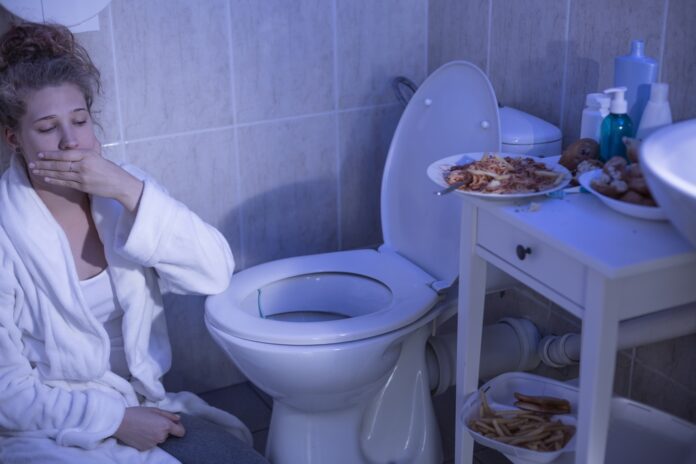Overview
Bulimia nervosa, often called bulimia, is a type of eating disorder. People with bulimia eat large amounts of food at one time, then try to get rid of the food or weight gain by throwing up, taking laxatives, fasting (not eating anything), or exercising a lot more than normal. Bulimia affects more girls and women than boys and men. Bulimia is a serious health problem, but people with bulimia can get better with treatment.
Cause
Many more women than men have bulimia. The disorder is most common in teenage girls and young women. The person usually knows that her eating pattern is abnormal. She may feel fear or guilt with the binge-purge episodes.
The exact cause of bulimia is unknown. Genetic, psychological, family, society, or cultural factors may play a role. Bulimia is likely due to more than one factor.
Symptoms
Bulimia affects everyone differently, so some women and girls may exhibit all these symptoms, while others may only show a few of them. This is dependent on a variety of factors, such as how long they have suffered from bulimia, their medical history, and how often they engage in bulimic behaviors.
Symptoms of bulimia nervosa include:
•Constant weight gain or loss
•Stomach pain not related to illness
•Dizziness
•Fainting
•Trouble sleeping
•Brittle hair and nails
•Discolored teeth
•The severity of a woman’s symptoms can be identified by how often she engages in behaviors associated with bulimia.
Treatment
•Psychotherapy
Psychotherapy refers to a range of treatments that can help with mental health problems, emotional challenges, and some psychiatric disorders. It aims to enable patients, or clients, to understand their feelings, and what makes them feel positive, anxious, or depressed.
•Cognitive-behavioral therapy (CBT)
CBT involves talking to a therapist, who will help you explore emotions and thoughts that could be contributing to the eating disorder, and how one feels about weight and body shape.
They will help you to adopt regular eating habits and show you how to stick to them. They should also show you ways to manage difficult feelings and situations to stop you from relapsing once the therapy ends.
•Self-care
It’s important to look after health while recovering from bulimia. If you are vomiting regularly, the acid in the vomit can damage teeth over time.
To minimize this damage one should:
•avoid brushing teeth immediately after vomiting so you don’t wear away the enamel
•rinse mouth with a non-acidic mouthwash make sure you see the dentist regularly
•don’t drink or eat acidic foods, such as fruit juice, during a binge and after purging
•don’t smoke
Vomiting can also lead to the risk of dehydration. To avoid this, make sure you drink plenty of fluids to replace what you have vomited.
•Medication
Medicines are sometimes used to help treat bulimia or the health problems it causes. You may get medicine to help improve the mood, control mood swings, and decrease obsessive thoughts. Vitamin or mineral supplements may also be needed if the nutrient levels are low because of bulimia.
Other
Exams and Tests
A dental exam may show cavities or gum infections (such as gingivitis). The enamel of the teeth may be worn away or pitted because of too much exposure to the acid in vomit.
A physical exam may also show:
Broken blood vessels in the eyes (from the strain of vomiting)
Dry mouth
Pouch-like look to the cheeks
Rashes and pimples
Small cuts and calluses across the tops of the finger joints from forcing oneself to vomit
Blood tests may show an electrolyte imbalance (such as low potassium level) or dehydration.
Source
https://www.womenshealth.gov/mental-health/mental-health-conditions/eating-disorders/bulimia-nervosa
https://www.timberlineknolls.com/eating-disorder/bulimia/signs-effects/
https://www.medicalnewstoday.com/articles/156433



